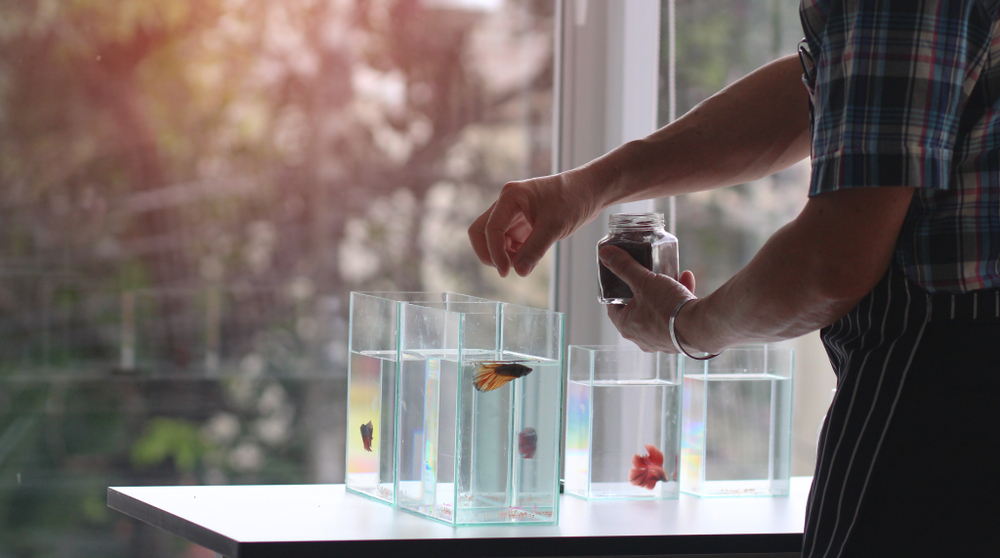If you want your betta to live healthily and comfortably, you can’t botch the job of regular feeding and nourishment. That means you either always have to be around to feed your betta or have someone around to do it when you aren’t.
But we all know things are different from how they ideally should be; sometimes, you don’t have any friendly neighbors around, and you can’t afford to hire someone to drop by and feed your bettas.
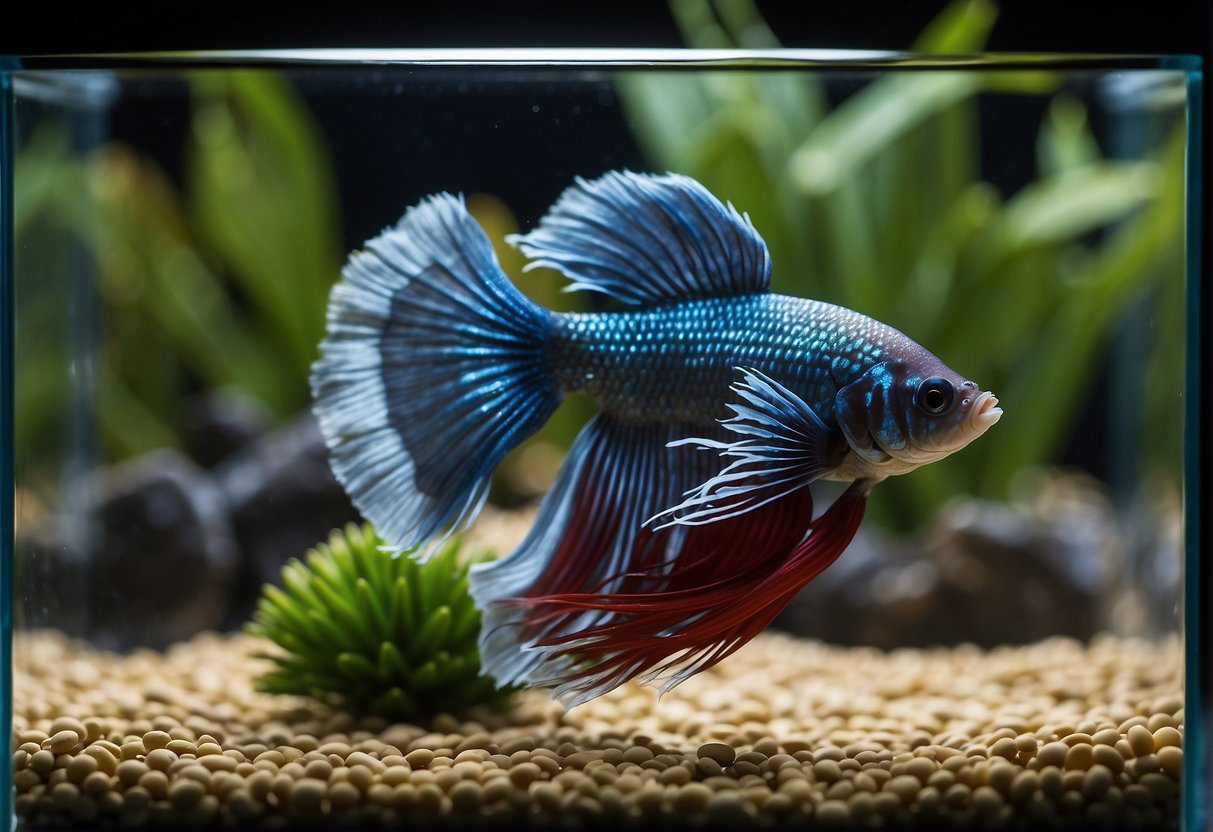
And so, you begin to wonder if it’s safe to leave your little pet nutritionally unattended for, you hope, just a few days before you rush back to tender an appetizing apology. In this post, we will answer that question for you.
We’ll cover everything from ideal feeding frequency and ways to prepare your betta for your absent periods to betta fasting, potential benefits, and the risks associated with food-free periods,
Contents
Understanding Betta Fish Dietary Needs
Flourishing Betta fish largely depends on their diet. Correspondingly, the time an organism can go without food depends partly on what food it eats and how its body operates in the presence or absence of that nourishment. So, what do betta fish eat?
As obligate carnivores, betta fish need protein-rich diets to remain healthy. In their natural habitat, this means preying on insects and larvae. In captivity, they can live on a more varied diet, which still needs to mimic what they eat when out in nature to prevent nutrition-related health complications.
The dietary regimen for your betta can include high-quality pellet foods, live or frozen brine shrimp, bloodworm, and daphnia. Now, while betta are carnivores, it isn’t uncommon to notice them nibbling on the plants in the aquarium.
When your betta does this, it’s either curious or hungry beyond belief; in the latter case, you must immediately feed them something they actually enjoy.
Your betta’s diet should contain some live food for one very important reason: it allows the betta to exhibit its natural predatory behavior, allowing it to enjoy the meal fully.
Understanding your betta buddy more with these other top picks:
- Can Betta Fish Live in Tap Water?
- Do Betta Fish Hibernate?
- Betta Fish Laying on Bottom of Tank: Is It Normal or a Sign of Stress?
Feeding Frequency and Amount
You must never forget that betta fish are also prone to overfeeding, which can cause health problems. You need to feed them the right amount of food at the appropriate frequency. The ideal feeding frequency for betta fish is twice daily, and the appropriate amount is as much as they can in 2-3 minutes. The total daily diet should ideally not exceed 1.8 grams.
Handling Absences
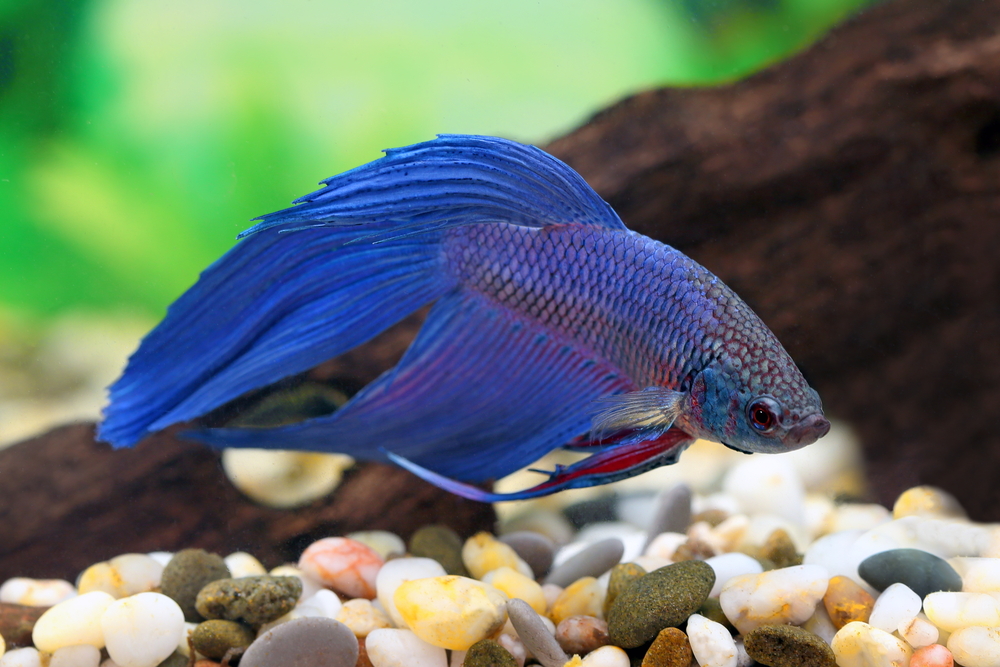
Being a betta aquarist requires spending quite some time seeing your fish’s needs daily. But then, there are times when you need to be somewhere far away and won’t be able to do what is necessary for your betta. What do you do about such moments?
One option may be to consider the duration of your absence and, if it’s brief enough, have your fish fast through the whole period. However, as we will discuss soon, this is only sometimes ideal, so you need to make other arrangements. Let’s talk about those.
Planning for Vacations
The most obvious alternative arrangement to impromptu (or semi-promptu) betta fasting in your absence is to hire a fish sitter. That should be someone you can trust who can understand and implement your feeding instructions. Professional fish sitters are the go-to, but you may need access to or be able to afford one.
If so, you can find a relative or friend to drop by and see your betta. Either way, it’s important to give your sitter very clear, written instructions about the amount of food and the frequency of feeding. A professional fish sitter would already be knowledgeable about feeding and caring for betta fish.
Still, mistakes and lapses of memory and judgment can happen, and clear, written instructions can mitigate that.
Automatic Feeding Solutions
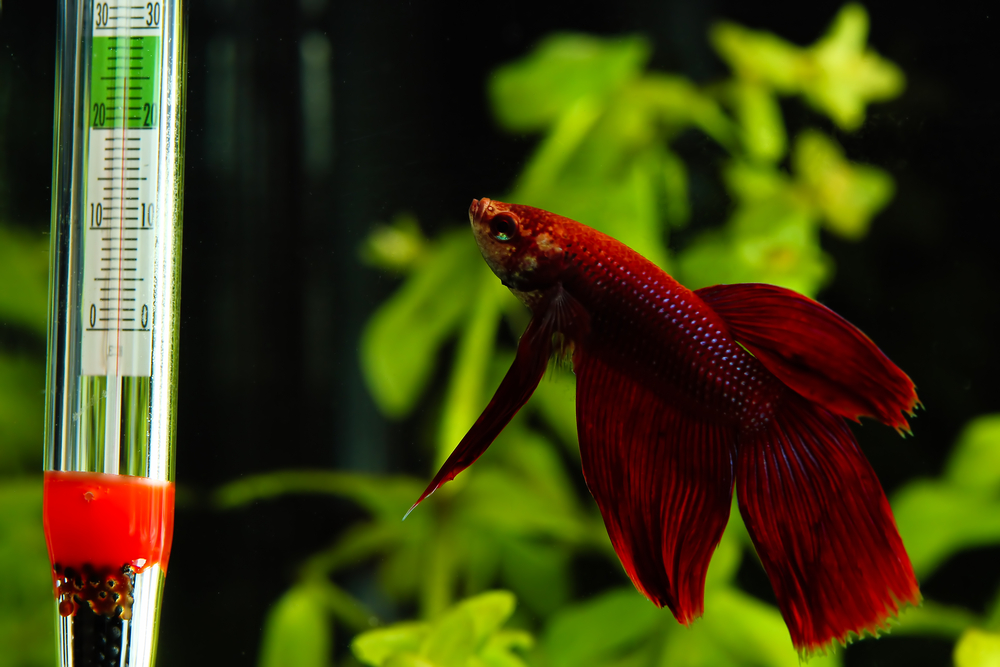
Suppose you’re going on vacation and cannot find a professional sitter or an acquaintance to attend to your betta in your absence. What do you do? It’s automatic fish feeder to the rescue.
Auto fish feeders allow you to create and maintain a reliable fishing schedule around a predictable food source that your fish can quickly become familiar with. You place food in the feeder drum, and the device dispenses food at specified times daily until the drum becomes empty.
These feeders can usually hold enough food to reliably feed your betta for up to 14 days—more than the duration of a short vacation. However, automatic feeders are a tad complex to use, so before you leave, you should test the device to confirm that it dispenses the correct amount of food.
Another option for its comparative simplicity is using feeding blocks. Feeding blocks are designed to release food into the tank slowly. However, feeders are the better option for their precision because feeding blocks may alter water quality if not carefully chosen.
Health and Well-Being
Going without food for significant amounts of time affects your betta fish in many ways, particularly their health. At the same time, being fed too much also comes with health risks. In this section, let’s look at some of these risks and the signs that indicate the hunger strike, whatever the reason, is beginning to tell on your betta.
Risks of Improper Feeding
Overfeeding is a prevalent improper feeding practice that can lead to serious health problems like constipation. Betta fish have small stomachs, and if you give them too much food, they won’t be able to eat it all up, so lots of it will spread out into and pollute the water.
Both of these can cause stress and contribute to diseases. Additionally, bettas that are fed too much can become lethargic, display a dull color, or even suffer from weight loss. All these can result from overfeeding itself or indirectly from polluted water.
Signs of Underfeeding
If you underfeed your betta fish, it will soon show indicative signs. These can sometimes be the same signs you see for overfeeding, such as lethargy and dull coloration. But there are also other signs like weight loss and, in long-term scenarios, stunted growth.
Facts about Fasting
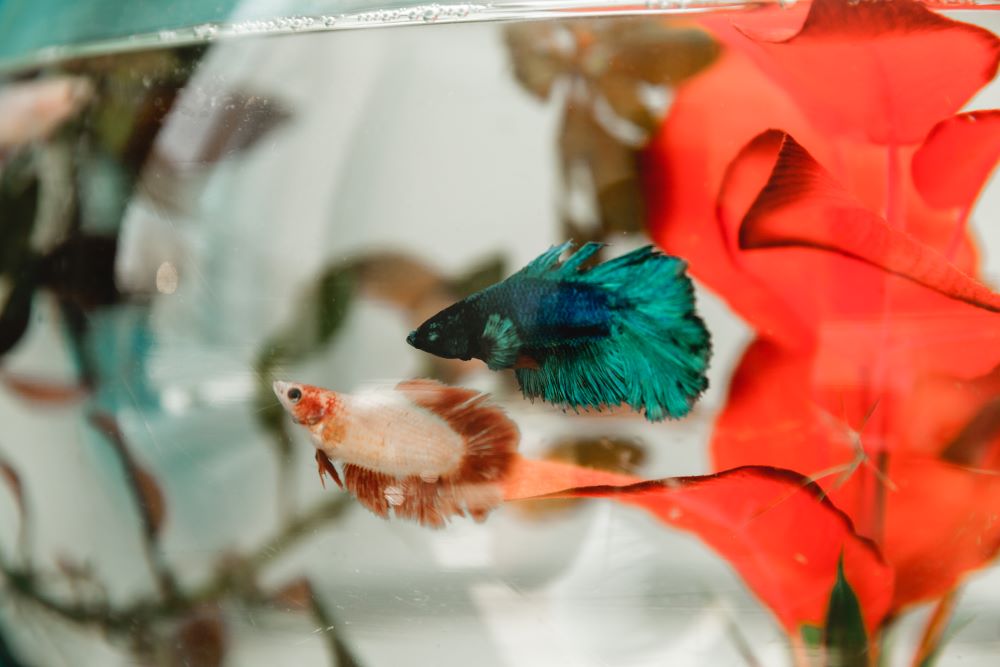
While it is generally inadvisable to leave your betta unfed for significant amounts of time, it is possible to put them on a fast without causing harm. It’s basically a strategic pause in their feeding schedule, which, when done correctly, can contribute to their health.
And so, let’s examine the benefits of fasting for bettas and understand how long these carnivorous fish can sustain without food.
Betta Fish Fasting Benefits
Fasting has several benefits that make it a worthwhile practice for your betta. In the wild, betta fish engage in periodic fasts because food is not always available. Their bodies have efficiently adapted to use their food and nutrient reserves during such periods. Essentially, fasting is a great practice for hunger management.
In the aquarium environment, betta fish are assured of a more regular food supply, so they don’t need to fast for hunger management. So, how can your aquarium betta benefit from the practice?
You will find it particularly useful if you have just overfed the fish, as fasting will give its digestive system time to digest all the food, preventing or reversing issues like bloating and constipation.
How Long Can a Betta Fish Go Without Food
We already know that betta fish can go quite a while without food because they fast in the wild. But how long, exactly, can they go?
For adult bettas, the maximum duration they can go without food typically ranges from 3-4 days to up to two weeks in some cases. These fish, as long as they’ve had a consistent feeding schedule, can survive without food while maintaining their health.
However, for betta fish fry, rapid growth and the need for nutrients to develop properly make the duration much shorter. The fry needs to be fed more frequently, ideally once a day, to consume the necessary nutrients from their food.
Aside from age and previous feeding frequency, there is also a health factor at play. A healthy betta can typically go without food for much longer than an unhealthy one. In all, you need always to be mindful that while adult bettas can handle short periods of fasting, extended fasting should be avoided to prevent health complications. Also, whatever you do, never make your young betta go without food. It may harm them.
Conclusion
While betta fish can survive for up to two weeks without food, it could be better. Think of it as a temporary solution, not a regular practice. It could also improve their health, as you may need to set your bettas on a fast.
Still, to keep your bettas in optimal health, stick to a regular feeding schedule and consider a trusted friend or automatic feeder if you’re ever away for a short trip. Remember, a healthy diet is key to a vibrant and active betta!
Frequently Asked Questions
This section will address some of the most common inquiries about betta fish’ feeding requirements and care during periods without food.
What is the maximum period a betta fish can survive without being fed?
A betta fish can survive for up to two weeks without food, but it’s not recommended as it may lead to health complications. For more on this topic, check out the differences in a betta fish’s response to short-term versus longer fasting periods.
Is occasional fasting beneficial to a betta fish’s health?
While bettas can manage brief periods without food, and an occasional fast may aid digestion, extended fasting is not advisable as it can be harmful. It’s critical to strike a balance in their feeding routine.
What are the risks of leaving a betta fish unfed for an extended period?
Long-term fasting can lead to a weakened immune system and potential health issues. Risks include a loss of muscle mass and a decrease in metabolism.
How to care for a betta fish during a short-term absence?
If you will be away for a few days, you need to see that your betta’s environment is clean and the water quality is optimal. Bettas can self-sustain for a short period and are usually fine when left alone.
What feeding schedule is optimal for maintaining a betta fish’s health?
You should make sure your betta’s feeding schedule includes small, regular meals it can consume within two to three minutes to prevent overfeeding and maintain its health. Their ideal feeding regimen should involve tailored quantities of food based on activity levels and individual needs.
Can betta fish’s feeding be adjusted for vacation periods without harm?
You must be careful when adjusting your betta’s feeding schedule to accommodate your vacation periods. Bettas can go without food for short periods. For longer absences, though, you should consider options such as automatic feeders or arranging for someone to feed them at regular intervals.

Ian Sterling, founder of Fishlab.com, began his aquarium journey over 30 years ago, driven by a deep fascination for fish and their diverse personalities. His website, Fishlab.com, is dedicated to making fishkeeping accessible and enjoyable, offering beginner-friendly guidance, expert insights, and a community for aquarists to connect and share experiences.


